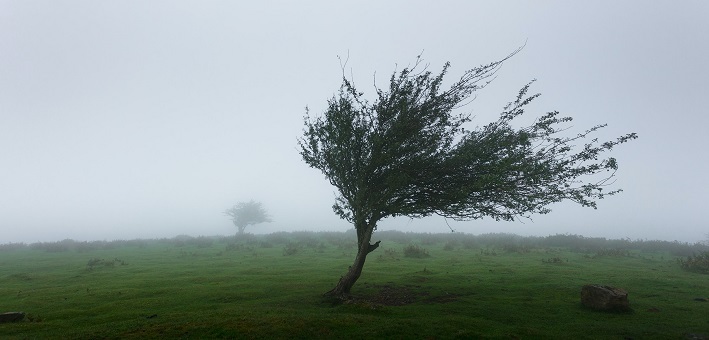Commentary on Psalm 63:1-8
The entry into this psalm provided by the superscription locates not only David, but ultimately also the reader, in the Judean Wilderness. There is hardly a better location than the wilderness—certainly in the Holy Land—to get a sense of where the psalm takes us next: to the experience of thirst.
If you have never experienced the Judean Wilderness first-hand, a quick internet image search on the term would prove very enlightening. Aside from the few late winter and early spring months when the wilderness receives its annual 3-6 inches of rainfall, the rocky, mountainous landscape is quite dry and barren. While there are widely scattered springs, such as at Ein Gedi, they are of no help if the sojourner is unaware of their location. And the salt-laden waters of the Dead Sea at the wilderness’ edge can do no more than amplify one’s sense of desperation for hydration.
In addition to the experience of literal thirst for water, the profound stillness and isolation of the wilderness are ideal to inspire reflection on that which can satisfy the deep, profound thirsts of humanity. Over the centuries, the wilderness has been the home of many monasteries—some still to this day (such as the St. George’s on the Wadi Kelt and road to Jericho). Likewise, it is no coincidence that we find John the Baptizer in the wilderness as he discerns and articulates the message God has called him to proclaim. Even Jesus has a profound experience in the wilderness—being driven there for 40 days and nights of fasting, followed by the temptations of Satan.
Among the gifts of the spiritual disciplines of Lent may be a consideration of our thirsts. What do we thirst for? Which of our thirsts are profound and in need of nourishing? Which ones are fickle, or perhaps damaging, and in need of starvation? Where do we find refreshing water for our most profound thirsts? With the backdrop of the wilderness, Psalm 63 provides powerful guidance to navigate these questions.
Utilizing the imagery of the wilderness, verse one places the seeking and thirst for God “in a dry and weary land, where there is no water.”1 Note carefully that the text is not saying that seeking God is like searching for water in a dry and weary land, as if God is difficult, or nearly impossible, to find. Rather, the wilderness landscape is the setting from which our seeking takes place.
The root cause of our thirsts is sometimes not the absence of those things that would quench them, or the impossibility of finding them. Rather, deep thirst frequently stems from a displacement of the water we truly need by other things that falsely claim to be as good or even better than the “true water” itself. We need not peer very deeply into the marketing of our materialistic, profit-driven culture to realize that we face a daily barrage of suggestions of things we may readily purchase to satisfy our various thirsts. Unfortunately these thirsts tend to be ephemeral and the resulting quench equally short-lived, only to be replaced by another thirst with a similarly disappointing outcome.
Sometimes, however, we cling to a misguided thirst which takes on a life of its own as a full-blown addiction. In fact, if we are honest with ourselves, we all suffer from one, or likely more, addictions. All addictions draw attention away from our deepest thirsts and divert energy toward satisfying thirsts that can never be satisfied or offer any lasting satisfaction. Unfortunately, the diversion often becomes so profound that other, necessary thirsts are left weary and dry. For example, the perceived need to satisfy the thirst for alcohol or drugs can completely overshadow and dehydrate the thirst for relationships with family and friends, for food, for meaningful employment, for even simple things like personal hygiene.
Psalm 63 emphatically declares that our thirsts go far beyond water or anything else that this world can tangibly provide. To be sure, God has given us a land that flows of milk and honey. The creation is good, indeed, very good. God brings forth bread from the earth and creates the fruit of the vine. Our physical hunger and thirst can be well-satisfied. However, we dare not confuse creation with creator. The sum total of all creation and its bounty will never be enough to satisfy our deepest thirst. And so, harkening back to verse one, if we look only to creation and what it can offer for God, it will quickly become “a dry and weary land, where there is no water.”
In verse two, the psalmist directs our attention elsewhere—to the sanctuary2—where one might see not just creation, but creator. But what one discovers in looking beyond creation and what it can offer goes even further than the power and glory of God experienced through the sanctuary. God’s glory and power ultimately manifest in steadfast love.3 The psalmist goes so far as to say in verse three that God’s steadfast love is “better than life”—in other words, better, by far, than anything that can be found or experienced in this world. Notice that it is with this realization in verse three that thirst and dryness dramatically shift to blessing, lifting up of hands, praising, and satisfaction. Upon discovering the spring of God’s steadfast love, we are no longer in the wilderness, but in verse six, comfortably and safely in bed meditating on the faithfulness of God and protective shadow of God’s wings.
In contrast to the shallowness of many of our thirsts, the psalm emphasizes the depth of our most essential thirst by three times referencing the soul.4 It is the soul that “thirsts” for God (verse 1), is “satisfied” by God (verse 5), and that thus “clings” to God (verse 8). We cannot ignore the thirsts of our bodies. “I will bless you as long as I live” (verse 5) implies that sustaining life is important! But with Shrove Tuesday and Ash Wednesday having reminded us that there is more to life than pancakes and sausage, Lent calls us to focus our attention on our greatest thirst, that which emanates from the very core of our being, and to remember that the only thing that can ever satisfy that most profound of thirsts is the steadfast love of God.
Notes
- Biblical references are from the NRSV unless otherwise noted.
- “holy place” in Hebrew.
- “Lovingkindness” in the KJV. The Hebrew term is hesed – God’s incredibly abundant unqualified love. See also the parallel Greek term of agape.
- The Hebrew term is nefesh and should not be confused with the Greek sense of “soul” as an entity separate from the physical body and in need of liberation from it. Nefesh, instead, refers to a person’s whole being, the life-force that is a person.


March 20, 2022